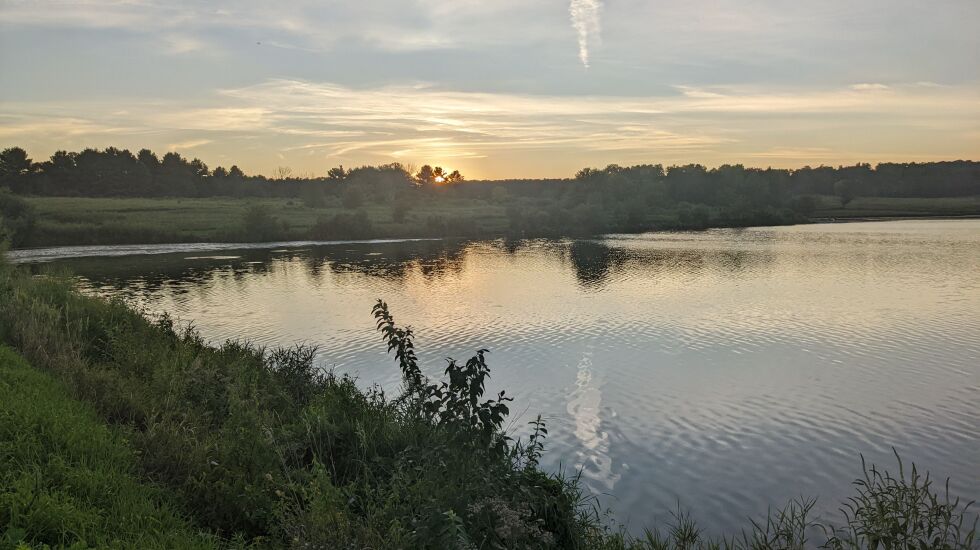
SHABBONA — “They are in the jumps, as they say down south,” fisheries biologist David Wyffels said.
That’s my kind of turn of phrase, my kind of fishing.
I made it to Shabbona Lake Friday to try topwaters for hybrid striped bass.
An owl called repeatedly in the evergreens with two hours of daylight remaining, as I set up on the dam. Canada geese clustered and fussed. Swallows dive-bombed something I couldn’t see.
Many baitfish dimpled the surface. I hoped something would bust them.
Right on time at 6:56 p.m., the first two busts on the surface came, out of casting range.
Two weeks ago Aidan Sawyer, who works at Boondocks, said topwaters were beginning to work for hybrids around 7 in the evening. Sawyer, who was on the bass team at Indian Creek, said catfish guys also caught some with chicken liver. Since I arrived early, I threw out a line with chicken gizzards (one bite, probably a catfish) before bombing topwaters.
“They are working the balls of gizzard shad in the pelagic zone [open part of the lake],” Wyffels said. “They work as a group or a team and work a ball of [shad] and push them to the surface. Most of the time it is at dusk or early morning or an overcast day. It always seems to be late summer and beginning of fall when they begin to pack on the feed bag.”
Hybrids (1- to 3-inch fingerlings) are stocked annually at Shabbona, 11,859 last year. About the same is expected this year.
I thought they were stocked because they’re great fighters, but Wyffels enlightened me, “They are hard fighting fish, but one of the main functions is to control the schooling [gizzard] shad. They are really good at controlling those pelagic species. That is their primary food.
“It is some of the most awesome fishing, just bomb Zara Spooks.”
I bombed large and small poppers, trying to time when hybrids busted shad. I only had one tiny smallmouth bass or bull bluegill go on a small Pop-R.
It was such a beautiful night, I didn’t give a damn, and stayed until full darkness. Not smart, since I’m getting too old to lumber up a bank in dark.
It was time, past time.
The daily bag is three striped, White, or hybrid striped bass with a 17-inch minimum length.
Through Sept. 30, site hours are 6 a.m. to 10 p.m., plenty of time to catch that final hour of light.
Honor
Friends of the Chicago River received the President’s Fishery Conservation Award from the American Fisheries Society for dedication to improving aquatic habitat.
Illinois hunting
No beans or corn are harvested, which may challenge hunters in the early Canada goose season, Thursday Sept. 1 through Thursday Sept. 15.
Wild things
Readers sent multiple reports of nighthawks beginning last week. ... The neighbor’s linden tree began yellowing and dropping leaves last week.
Stray cast
If the World Series is a muskie, the Sox are bluegill anglers (no offense to my beloved panfish).







